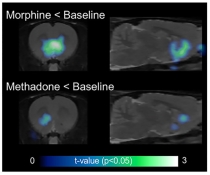Scientists are working to develop medicines that have the pain-relieving effects of opioids without the high risk of misuse and addiction. Since misuse is linked to the euphoric effects of the drug, investigators led by scientists at NIDA’s intramural labs are studying methadone, a drug used to manage opioid addiction that does not have euphoric effects as strong as many other opioids.
Animal studies show that mu opioid receptors in the brain play a key role in the reinforcing effects of opioid drugs, whereas the neuropeptide galanin counteracts the effects of mu opioid receptors. In a recently published study, investigators found a significant difference in the mechanisms of action between methadone and morphine that is determined by the activation of opioid receptor complexes (heteromers) composed of both mu-opioid receptors and one of the galanin receptor subtypes; differences that are key to their subsequent effects on the brain’s dopamine system.
The investigators found that the opioid-galanin receptor heteromers determine the different effects of methadone as compared to morphine and fentanyl, showing methadone with a weaker ability to activate the dopaminergic system linked to the euphoric effects of opioids. These results should advance the search for opioids less likely to attach to opioid-galanin receptor heteromers, exemplified by methadone. This finding also enables the search for compounds that activate galanin receptors, which would be expected to reduce the abuse liability of opioids.
The research was done by scientists at NIDA’s intramural labs in Baltimore, the University of Maryland, Harvard Medical School, and the University of Barcelona.
For a copy of the article, published in Journal of Clinical Investigation, go to Opioid-galanin receptor heteromers mediate the dopaminergic effects of opioids.
For more information, go to Opioids.
For more information, contact the NIDA press office at media@nida.nih.gov or 301-443-6245. Follow NIDA on Twitter and Facebook.
NIDA Press Office
301-443-6245
media@nida.nih.gov
About the National Institute on Drug Abuse (NIDA): NIDA is a component of the National Institutes of Health, U.S. Department of Health and Human Services. NIDA supports most of the world’s research on the health aspects of drug use and addiction. The Institute carries out a large variety of programs to inform policy, improve practice, and advance addiction science. For more information about NIDA and its programs, visit www.nida.nih.gov.
About the National Institutes of Health (NIH): NIH, the nation’s medical research agency, includes 27 Institutes and Centers and is a component of the U.S. Department of Health and Human Services. NIH is the primary federal agency conducting and supporting basic, clinical, and translational medical research, and is investigating the causes, treatments, and cures for both common and rare diseases. For more information about NIH and its programs, visit www.nih.gov.
NIH…Turning Discovery Into Health®


